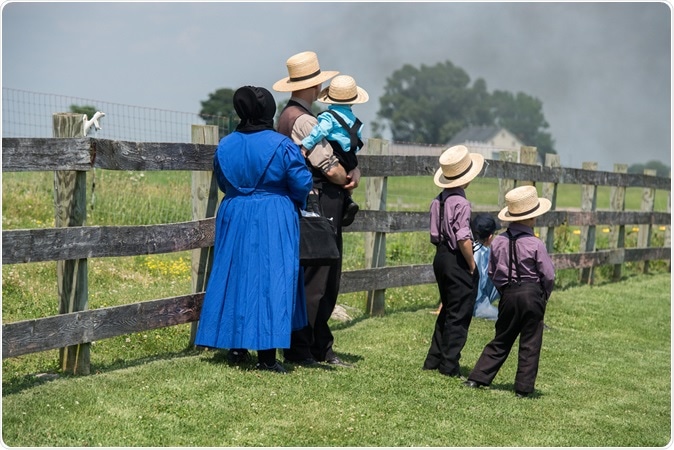Scientists have stumbled upon a genetic mutation that is found among the Indiana Amish community people that leads to impaired or defective blood clotting but predicts a longer life span for them. The study was published this week in Science Advances.

Amish people. Image Credit: Andrea Izzotti / Shutterstock
The first case was of a girl from the community almost two decades ago who bled to a life threatening situation from a routine scalp surgery. She was studied extensively and it was found that she has some specific genetic mutations that made her different. She had two copies of a mutant gene which made her incapable of making the right proteins that are necessary for clotting of blood. However a new study found that those in the Amish community who had only a single copy of this mutant gene could not only increase their life span by up to 10 years but also protect them from diabetes.
According to says cardiologist William Fay of the University of Missouri in Columbia, one of the researchers on this team, this is a remarkable finding. He explained that while this genetic mutation is not a new finding, its association with protection from diabetes is an “important piece of evidence” that connects genes with aging. Genes, he explained, could be the next targets of therapy to prevent age related disease and damage. He noted that even now Japanese researchers are working on a gene therapy that could alter the genes in a unique manner that could protect individuals from kidney disease, diabetes and obesity.
Lead author cardiologist Douglas Vaughan of the Northwestern University Feinberg School of Medicine in Chicago, Illinois, said that they had to go back to the original girl who had the two copies of the mutations to understand the role of the gene in other functions than blood clotting. A total of 176 persons and the original woman from the Amish community conseted to be a part of this study he said.
This Group of Amish Live Longer. Here's Why.
The team found that plasminogen activator inhibitor type 1 (PAI-1) is a protein that is encoded by a specific gene in the body. They noted that those who are obese or at risk of diabetes seem to have high levels of PAI-1 in their blood. Researchers in their previous studies have shown that mice who had more PAI-1 in their blood aged faster than those who did not.
The Amish community is a small closed community that has descended from a couple that came in from Switzerland six generations ago. There has been little or no genetic mixing from outside communities within the Amish. This makes them ideal for a genetic study such as this. The researchers noted that hundreds of these Amish individuals carried a mutation in their SERPINE1 gene. They enrolled 43 individuals who had one copy of the faulty gene and compared with normal people within the community that had two normal versions of this gene.
Telomeres are caps that are placed at the ends of the chromosomes. With age these wear off and slowly the ends of the chromosomes wear off leading to several age related problems and conditions. The results from this study revealed that those who had one copy of the altered gene had longer telomeres that could persist with aging. These individuals with one faulty gene also had lower levels of insulin within their bodies after an overnight fast. Their blood pressure and stiffness of the arterial walls were also better than those who had normal genes. They were protected against diabetes and heart disease. Median lifespan of these individuals was 85 years which was a decade more than other members of the community. They calculated the life expectancy from death records and family histories.
Human geneticist Andrew Johnson of the National Heart, Lung, and Blood Institute in Framingham, Massachusetts said that the protective effect of the gene can be said with some amount of certainty from these findings. Not all experts are convinced though. Vaughan, the lead author, who has been studying PAI-1 for almost three decades said that this result was astonishing because one gene could show “anti-aging benefits across multiple body systems.” “Not only do they live longer, they live healthier. It’s a desirable form of longevity. It’s their ‘health span,’” he said.
The research was supported by National Heart, Lung and Blood Institute of the National Institutes of Health.